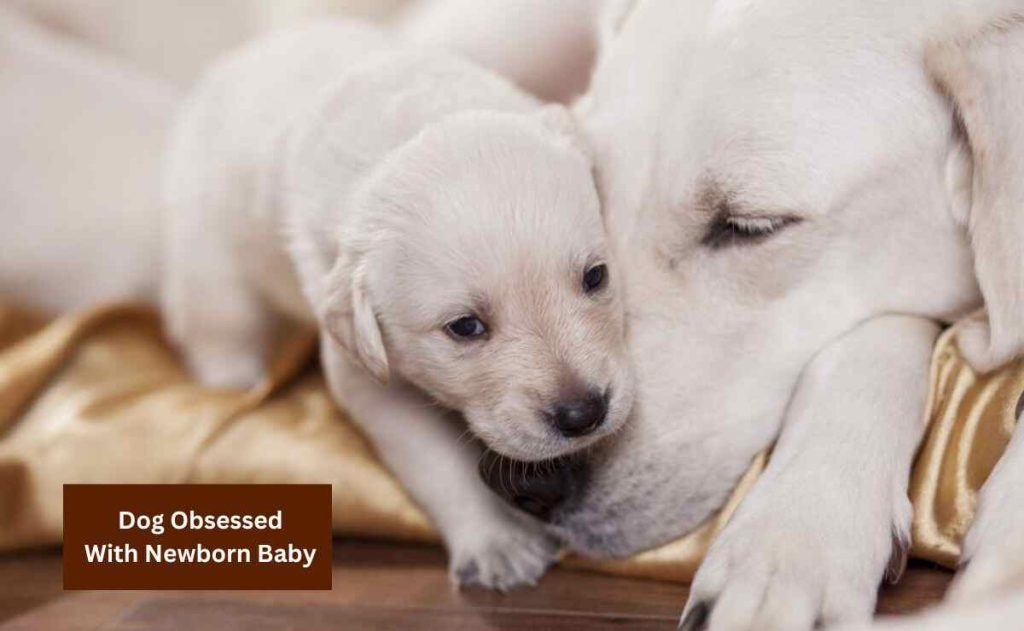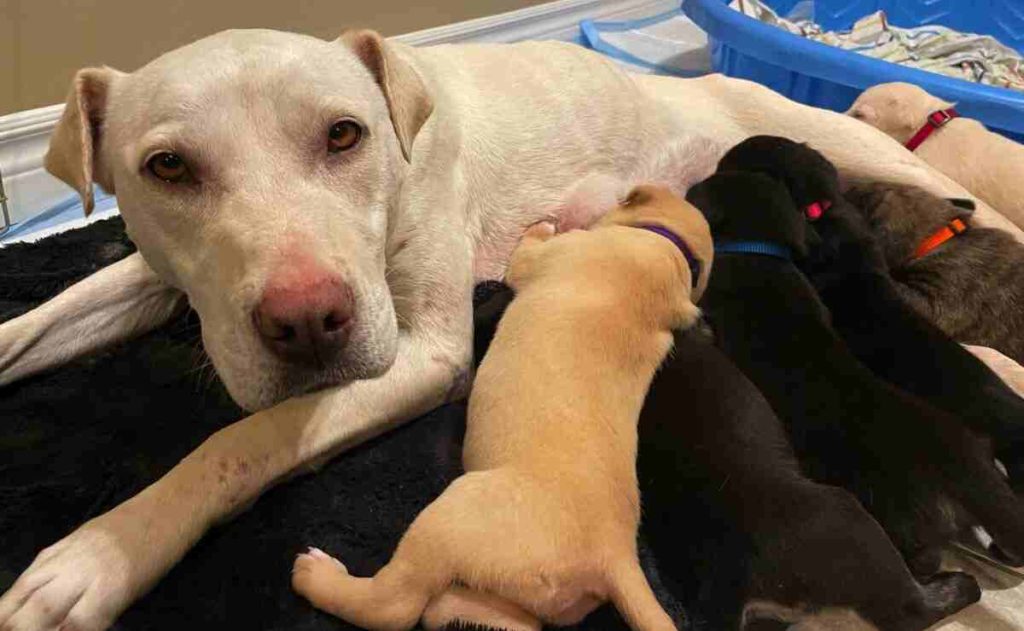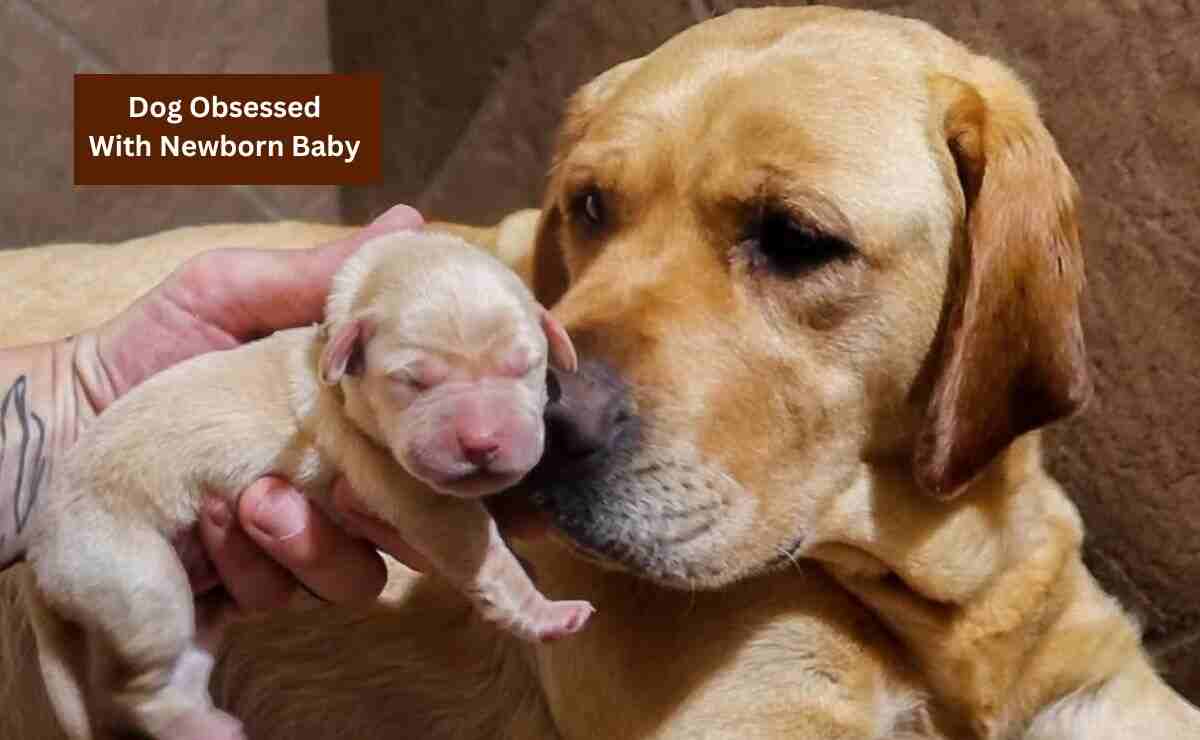Welcoming a newborn baby is a fascinating experience for the whole family. It’s also common for dogs to show a strong interest in newborn babies. Natural curiosity in dogs can lead them to become fixated on a new family member.
But why is dog obsessed with newborn baby? What do they think about this change? Is it concerning?
Well, the relationship between canines and humans is undoubted. They form strong bonds with their owners and can recognize them, even after many years apart. Dogs are loyal protectors and love their owners unconditionally. They recognize changes in the family and understand that they now have a new family member.
This explains why dogs can become so fascinated with newborn babies. Dogs are simply curious about the new members of the family and would like to get to know them better. Perhaps, they are fascinated by the baby’s smell, movements, and sounds.
Why Is Dog Obsessed With Newborn Baby?

Bringing a newborn home often leads to your dog eagerly nosing through the baby carrier, excited to meet the newest family member. Dogs love being part of family activities, and the arrival of a baby is particularly thrilling for them.
Genetic Bond
Dogs can build a strong bond with humans. In fact, dogs with minimal human contact can understand the pointing gestures. It’s actually the strong genetic basis behind the skill. Parent dogs try to provide maximum attention to the newborn puppies.
There is some hormonal reaction that creates the bond naturally. It’s called love hormone which is actually oxytocin. It fosters feelings of attachment and trust between individuals, playing a significant role in the unique bond between humans and their furry friends.
Remarkably, emotional distress is observed in dogs when separated from their owners, similar to the distress infants feel when unable to find their parents. This parallel experience further strengthens the theory that dogs possess an inherent and genetic connection to humans, transcending the boundaries of mere companionship.
Protectiveness
Looking at the connection between your dog and newborn baby aligns with this historical bond. From the dog’s perspective, the newborn is a fragile, vulnerable, and weak member of the pack that needs protection. This protective instinct originates from the evolutionary trade we established earlier with dogs.
In contemporary settings, your dog’s protective instincts become most apparent when someone unfamiliar visits. The barking at guests is an expression of your dog’s commitment to safeguarding the family unit, especially the newest and most vulnerable member.
That’s why parent dogs specially mother don’t want to leave the newborns alone. They follow the baby around the house and protect their buddy.
Playful Tendencies
Dogs, especially young ones, see a new baby as a playmate. Their excitement is cute, but you should watch how they play. Puppies are full of energy and might not realize how delicate a human baby is.
If your dog gets too playful or seems a bit too energetic, keep a safe distance. Even if your pup drops a toy in the baby’s crib – cute, right? – watch for any nipping or pushing. As a parent, you need to control these interactions and decide if it’s safe.
Don’t leave your dog and baby alone until the child is older. Give your pup playtime away from the baby, like walks and fetch, to use up their energy in a positive way. This keeps everyone happy and safe.
Possessiveness
Certain dogs may show possessive behavior around a new baby. This can include barking, standing between the crib and the family, or trying to claim the baby’s things. As a result, it is very difficult to separate new born puppies from their mother for a long period.
To ensure safety, address possessiveness early on. This behavior might stem from the dog feeling neglected. Set clear boundaries, like keeping the dog out of the nursery and supervising interactions.
Avoid harsh scolding, as it can create negative feelings. Instead, work on slowly introducing the dog to the new routine and building a healthier relationship.
Curiosity
Another reason behind your dog’s fascination with a newborn baby is simple curiosity. Babies have a distinct smell that captivates everyone, especially your dogs. Given your dog’s heightened sense of smell compared to yours, this aroma becomes even more intriguing.
The arrival of a newborn introduces a new and unfamiliar presence in your dog’s environment. Naturally, he’ll be curious, observing the baby’s habits, sounds, and smells. Remember, your dog has just mastered understanding your behavior; give him time to adapt to these changes.
In his world, the baby’s sudden cries, strange noises, and different scents are like solving a puzzle. It’s a new experience, and your dog is trying to figure out this tiny, squeaky addition to the family. Give him some space and time to navigate this “ruff” day of discovery.
How to properly introduce a newborn baby to your dog?
To help your dog adjust to the new baby, there are a few strategies you can try. Firstly, ensure that your dog is well-exercised and mentally stimulated. A tired dog is generally calmer and less likely to become obsessed with the baby.
Additionally, gradually introduce your dog to the baby, allowing them to sniff and observe from a safe distance. Also, reward them for calm behavior with praise and treats.
Creating a positive interaction between the baby and the dog is also important. Try to give the dog special attention and treats when the baby is present. Consider incorporating the dog into the daily routine with the baby, such as going for walks together or allowing the dog to be nearby during feeding and playtime.
Dog’s Obsession For Baby – Is It Okay?

While your dog’s baby obsession is a natural reaction, it can manifest in various tones, some of which may raise concerns. If you want to determine whether your dog’s behavior is safe with your child, you need to pay close attention to how he interacts with him.
The initial curiosity and excitement of your dog are common and generally harmless. However, it’s essential to ensure that the interaction remains positive and safe for both the dog and the baby. If the dog shows signs of anxiety, aggression, or excessive possessiveness, it becomes crucial to address and manage these behaviors.
To ensure a pleasant relationship within the family, you must understand your dog’s reaction to the newborn and remain vigilant about their interactions with the newborn. Always prioritize safety and seek professional advice if any concerns arise regarding your dog’s behavior around the baby.
Tips to Maintain Dog Behavior Around Newborn
If you want to ensure a positive relationship between your dog and newborn, it requires proper training and management. Follow these tips to create a safe environment:
- Always supervise interactions between the dog and the newborn to ensure safety and positive experiences.
- Keep the baby’s room off-limits until the dog learns appropriate behavior.
- Use baby gates or crates when supervision is not possible to prevent unsupervised contact.
- To minimize potential risks, do not leave the dog and baby alone together.
- Give positive reinforcement, such as treats and compliments, to reinforce good behavior around the baby.
Conclusion
Every dog is different, and it may take time for your dog to adjust to the new family member. With patience, consistency, and proper management, you can help your dog develop a healthy and positive relationship with your newborn.
You can follow our tips and tricks to manage your dog’s behavior.
